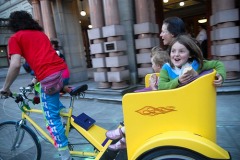
It would sure be fun!
(Photos © J. Maus)
Take a seat and join me on a tour of interesting stories from around the Web. Here’s your Monday Roundup…
In the world of bikes:
- As the rest of the economy falls, bicycle retail is doing just fine, reports an Atlanta newspaper. Stay tuned here at BikePortland for more coverage of the bike economy in the coming weeks.
- San Francisco has released a Draft Environmental Impact Statement outlining the environmental impact of bike lanes, reports the Bay Guardian’s Steven Jones. The 1,353 page document was created after a man sued the city, and won, effectively halting all bike infrastructure improvements for several years until city officials submitted their bike plans for environmental review.
- Portland-based bike builder (and former product designer) Aaron Hayes gets some major attention from one of the web’s best design blogs. Check out this great Q & A with Aaron as part of Coroflot’s Creative Seeds series.
Carfree news:
- After a successful week-long carfree experiment last year, Fazilka, (pop. 64,000), a town in India near the Pakistan border, will permanently ban motorized four-wheel vehicles from its city center during daylight hours. (Take that, Commissioner Leonard!)
- The 2010 Gran Prix in Donington, England is being billed as a “carfree” car race. Event organizers plan to bring all spectators to the event by public transit, and there will be no public car parking at the event.
Trend watch:
- The Sunday Oregonian featured an opinion column by an urban planning student who berates us all, in many ways rightly, for bashing the suburbs rather than proposing solutions for their increasing problems. The suburbs have become an integral part of our country’s cultural fabric, he points out, and we’ll get nowhere without a modicum of respect as we “rethink our relationship with the landscape.”
- A New York Times op-ed about the future of the publishing industry in the wake of Google’s deal to digitalize all the world’s books includes the following quote:
As a technology, the book is like a hammer. That is to say, it is perfect: a tool ideally suited to its task. Hammers can be tweaked and varied but will never go obsolete. Even when builders pound nails by the thousand with pneumatic nail guns, every household needs a hammer. Likewise, the bicycle is alive and well. It was invented in a world without automobiles, and for speed and range it was quickly surpassed by motorcycles and all kinds of powered scooters. But there is nothing quaint about bicycles. They outsell cars.
If you come across something on the web that you think we should now about, tag it with “bikeportland” on delicious.



